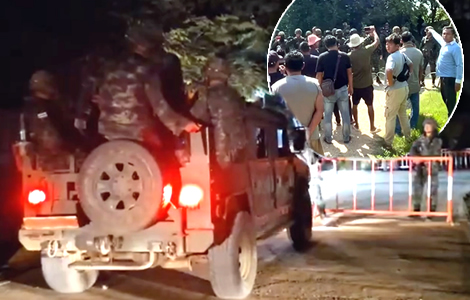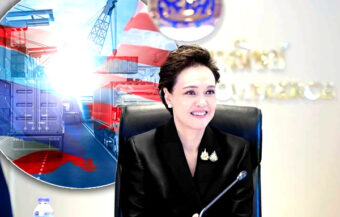Tensions boil at the Thai-Cambodian border as Cambodian villagers storm barricades, clash with soldiers, loudspeakers fuel chaos and Thai troops reinforce positions to prevent further escalation and maintain control over the disputed area.
Thai military planners sprang into action on Monday after reports surfaced that Cambodia was massing villagers near Ban Nong Chan in Sa Kaeo Province. Earlier, tensions erupted when Cambodian locals tore down a barbed wire barricade, clashing violently with Thai soldiers holding the line. The crowd, reportedly organised by Cambodian officials and fueled by loud music from speakers, sent tensions soaring. Before that, Thailand’s 2nd Army commander, Lieutenant General Boonsin Padklang, ordered that soldiers were authorised to fire on any Cambodian personnel found planting mines—after first issuing a warning shot. The standoff marked one of the tensest moments along the border in recent weeks.

Tensions on the Thai-Cambodian border escalated sharply on Monday as Cambodia mobilised civilians and military assets. Reports indicate that up to 200 Cambodian villagers camped overnight near Ban Nong Chan in Sa Kaeo Province. Meanwhile, Cambodian authorities announced intentions to reinforce these numbers in the coming days.
The Royal Thai Army moved quickly to strengthen security at emerging flashpoints. In addition, border commanders increased patrols to monitor the situation closely. Rising controversy over barbed wire barricades has drawn attention from both sides.
Previously, Phnom Penh offered to cooperate in demining operations if Thai barbed wire was removed. However, this offer was rejected outright by Lieutenant General Boonsin Padklang, commander of the 2nd Army.
Thai troops ordered to fire on any Cambodian forces who plant mines as diplomatic efforts continue in Geneva
Furthermore, the senior Thai border commander announced that troops now have orders to fire on Cambodian soldiers or personnel planting landmines. He added that warning shots would be fired first, but anyone threatening Thai sovereignty would face direct fire. Cambodia has reportedly agreed to coordinate mine-clearing efforts, yet communications from Phnom Penh remain ambiguous and sometimes distorted.
These events coincide with the planned visit of Thailand’s Foreign Minister Maris Sangiampongsa to Geneva on Tuesday. There, he will present Thailand’s case regarding landmines to United Nations officials under the 1997 Ottawa Treaty.
Moreover, he will be coming from a high-profile signing in Stockholm on Monday between the Royal Thai Air Force and SAAB. The agreement is expected to deliver twelve Gripen jets between 2029 and 2034, with the initial instalment of four jets valued at ฿19 billion. Observers note that Sweden’s approval signals recognition of Thailand’s precise use of airpower during the four-day conflict with Cambodia in July.
On the ground, the situation remains highly volatile. Thai soldiers are stationed at Ban Nong Chan to prevent unauthorised incursions.
Minor riots break out as Cambodian villagers dismantle barricades while loudspeakers raise border tensions
Reports from Monday night indicate that Cambodian authorities used loudspeakers to encourage villagers to gather in the disputed area. In addition, Cambodian military, forestry and land officials were present, overseeing civilian mobilization.
Earlier on Monday, when villagers arrived, a minor riot broke out. Some Cambodians stormed the barbed wire fence erected by Thai forces. They also threw objects at soldiers, injuring one on duty. Consequently, Thai troops reinforced security to prevent further escalation. Meanwhile, more Cambodian citizens continued arriving, increasing tensions.
Adding to the pressure, Cambodian authorities reportedly played loud music across the border, presumably a rousing anthem to boost morale. The music created a psychological effect on Thai officials and heightened the urgency for control. Nevertheless, Thai soldiers remained in position, monitoring for potential clashes. Local forces coordinated closely with the central government to report developments and prepare contingency plans.
Army spokesman Major General Witaya Suvari confirmed that Cambodian villagers were used to dismantle barbed wire. Notably, the operation employed civilians rather than military personnel.
Thai forces reinstate barriers as over 200 Cambodian villagers mobilised to escalate border confrontation
Thai forces immediately reinstated the barriers, emphasising sovereignty. Reports indicate that over 200 villagers were mobilised, with more expected in the coming days. Consequently, Thai soldiers maintained a firm presence to prevent further confrontations.
At 4:52 PM, Cambodian villagers attempted to use a bamboo pole to breach the Thai barricade. Thai soldiers and Border Patrol Police intercepted the pole, resulting in injury to one soldier.
Additionally, verbal abuse was directed at Thai officers, further inflaming tensions. In response, the Royal Thai Army reassessed security measures and expedited the reinstatement of the barriers.
The Thai response was measured yet firm. Soldiers are instructed to monitor activity closely, fire warning shots if necessary, and maintain sovereignty. Meanwhile, Cambodian authorities have continued mobilising civilians, avoiding direct military engagement. Analysts suggest this tactic pressures Thai forces and risks further escalation.
Use of civilians to dismantle barricades seen as a provocative challenge to Thai sovereignty and control
Observers highlight that the use of civilians to dismantle barricades is unusual and provocative. Thai officials described the actions as a direct challenge to sovereignty. Consequently, military reinforcements, patrols and barricade reinstatement have been implemented to prevent recurrence. Army coordination with local authorities continues, ensuring real-time reporting and rapid response.
Tensions at Ban Nong Chan reflect broader disputes over land, sovereignty and border control. Barbed wire barricades installed by Thai forces aim to secure territory and prevent unauthorised crossings.
However, Cambodian authorities view these measures as obstructions and villagers have been encouraged to dismantle them. As a result, confrontations have become increasingly frequent and intense.
The incident also has regional implications. Thailand’s engagement with the United Nations and Sweden emphasises its dual approach: strong defence coupled with diplomacy. Foreign Minister Maris Sangiampongsa talks of adherence to international treaties while maintaining national security. Meanwhile, Thai military officials focus on border protection, civilian safety and maintaining control.
Cambodian locals gather at Ban Nong Chan as Thai forces reinforce positions and maintain rapid response
On the night of August 25, 2025, reports confirmed that Cambodian villagers continued to gather near Ban Nong Chan. Loudspeakers and music broadcasts were deployed to rally local residents.
Thai forces reinforced positions, ensuring rapid response to any potential incidents. Analysts note that civilian mobilisation complicates traditional military strategies.
Furthermore, Cambodian villagers attempted to physically remove barricades while verbally assaulting Thai soldiers. Thai forces acted quickly to restore barriers, preventing further encroachment. Observers note that the actions constitute a breach of Thai sovereignty and represent a provocative tactic.
Consequently, the Royal Thai Army emphasised the importance of vigilance and restraint in its response.
Military and government officials maintain that security measures are temporary but necessary.
Thai forces continue to coordinate closely with local authorities and central agencies. The primary objective remains to prevent clashes while preserving national sovereignty. Reports indicate that injuries have been limited to one Thai soldier, with no fatalities.
Cambodian authorities use civilians as proxies while Thai forces maintain control and reinforce border security
Additionally, Cambodian authorities have attempted to use civilians as proxies for military action. Analysts argue that this tactic signals a willingness to escalate tensions while avoiding direct conflict.
The Royal Thai Army confirmed that coordination with relevant agencies is ongoing. Security personnel are instructed to monitor for incursions, enforce barriers and report developments promptly.
Meanwhile, diplomatic engagement continues, emphasising adherence to international norms and treaties. Thailand seeks to balance border security with effective communication to prevent misunderstandings.
Observers report that tensions along the Thai-Cambodian border are unlikely to dissipate soon. Civilian mobilisation, music broadcasts and repeated attempts to dismantle barricades continue to escalate the situation. Thai authorities remain vigilant, ensuring that all operations are controlled, lawful, and measured.
Border incident carries political and strategic weight as Thailand asserts sovereignty as Cambodia provokes
Analysts note that the border incident has significant political and strategic implications. Thailand’s response is a combination of military enforcement, international diplomacy and public communication. The goal is to assert sovereignty without provoking full-scale conflict. Meanwhile, Cambodian authorities continue to rally civilian support, heightening the stakes.
In addition, the use of loudspeakers and music broadcasts indicates a psychological strategy aimed at Thai forces. Reports confirm that villagers remain engaged in ongoing confrontations, while soldiers maintain positions and monitor the area. Local officers coordinate with central command and military leadership to maintain order.
The Royal Thai Army has confirmed that temporary barricades will remain in place. Forces are instructed to monitor, respond to threats and reinforce sovereignty at all times. Analysts note that the Cambodian strategy of mobilising civilians creates complexity in enforcement and increases the risk of escalation. Indeed, an ‘accident’ may be the goal of such provocation.
Ban Nong Chan situation highlights sovereignty, civilian mobilisation in a test for Thai forces on high alert
Thailand’s military is committed to preserving national territory, while government officials seek a resolution to the ongoing conflict through coordinated military and diplomatic efforts. The continued presence of Thai forces ensures immediate response capability.
Despite tensions, Thai military commanders emphasise restraint. Soldiers are instructed to engage only when necessary, prioritising civilian safety. Furthermore, all operations are coordinated with central government agencies to ensure clear communication and rapid decision-making. Analysts note that this measured approach aims to prevent further escalation while maintaining control of the border area.
Thailand’s position recognised as Swedish Gripen Jets deal to be signed on Monday midday in Stockholm
Cambodia apologises for soldier on Tuesday who was ‘drunk’ when he interfered with ASEAN border visit
2nd Army chief warns Acting PM Cambodian regime cannot be trusted and that border must stay closed
Undeniably, the border dispute remains unresolved and at the same time risks escalation at any moment. Cambodian villagers continue to gather, dismantle barriers and challenge Thai sovereignty.
Meanwhile, Thai forces reinforce positions, monitor activity and coordinate with central command. Diplomatic efforts continue alongside military preparedness. The situation highlights the complexity of border management, civilian involvement and international security that has suddenly become a key concern for the kingdom.
Join the Thai News forum, follow Thai Examiner on Facebook here
Receive all our stories as they come out on Telegram here
Follow Thai Examiner here
Further reading:
US turns down Thai request for advanced F35 fighter jets but offers less expensive F16s and F15s
China could be an economic time bomb sitting on Thailand’s doorstep as Evergrande collapse nears


















